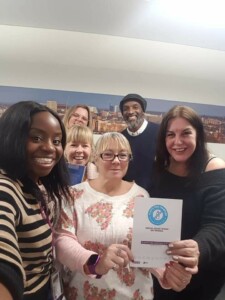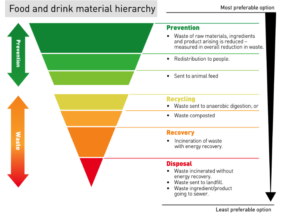This article was written by Paul Ducker, Resources and Consumption Theme Lead at Reading Climate Action Network.
What would it mean for Reading to be a zero waste, circular town? Why is this aim important to our climate ambitions? How are we doing and what more do we need to do to ensure that we can look back in 2025 and say we’ve made substantial progress?
This isn’t a comprehensive answer. But by focusing on three areas of the current action plan – plastic packaging, food waste and design for a circular economy – hopefully it is possible to see both the scale of the challenge and the opportunities.
Why zero waste? What does zero waste even mean?
Analysis by the Ellen MacArthur Foundation shows that if we solely focus on replacing fossil fuels with renewable energy, alongside increasing energy efficiency, we will only be able to address about 55% of our carbon emissions. To reduce the other 45% of emissions we need to look closely at the way we produce the stuff we use; the cars, clothes, food and the other products we use every day.
That doesn’t mean we can never throw anything away again. Rather, it is about focusing on the value in the resources used to make stuff and designing things and processes in ways that keep resources circulating at their highest value in the economy for as long as possible. As the Ellen MacArthur Foundations puts it, moving away from the current ‘take-make-waste’ linear economy towards one based on more circular, regenerative systems. It is a bit of a mind-shift. Instead of referring to waste, increasingly we need to talk about resources and how we can design products and processes to make it easy to recover and reuse them when they are no longer needed.
The waste hierarchy offers a good starting point in thinking about what we currently throw away and what happens to it. But on its own it is limited. If that is all we do we’ll simply be making the current, linear ‘take-make-waste’ system more efficient. But not changing the system. Circular design and regenerative systems offer the tools to rethink processes that have waste built in. You can find out more about the circular economy here.
There are other reasons for championing a less wasteful, more circular economy. In a world of finite resources it makes a lot of sense to value what we extract from nature. Apart from anything, demand for resources can drive environmental destruction and unsafe extraction practices. Plus, some of the scarcest resources come from areas of the world that are most unstable. There is a strong fairness element to the argument too.
So what is the picture in Reading?
Community calling time on pointless plastic packaging
Plastic Free Caversham was established in 2019 with the aim of getting Caversham recognised by Surfers Against Sewage as a Plastic Free Community, which they are well on the way to doing. They’ve recruited a number of business champions, each of whom have identified ways that they can cut single use plastics from their products or services. They’ve also recruited a cluster of local schools. To stay motivated and connected with one another during lockdowns, the group members held a series of ‘socially distanced litter picks’. More recently, as a very practical way to encourage more people to carry a refillable water bottle, they have been fundraising for a public drinking water fountain to be sited in Caversham.

One of the first things that the Plastic Free Caversham group did when it started was to organise a ‘mass unwrap’ at their local supermarket. On the day, as they left the store, people shopping at Waitrose in Caversham were politely invited to unwrap goods that they thought were over packaged in plastic and leave the discarded plastic at the store for recycling. This is something that Plastic Free Communities around the country have done and it is fair to assume that it is one of the reasons that more and more supermarkets are both offering plastic free aisles and facilities for people to return soft plastic for recycling. A reminder that we can all flex our power as consumers to change the behaviour of shops and service providers.
You can read more about Plastic Free Caversham in the blog post they wrote here:
https://readingcan.org.uk/caversham-community-group-reignite-plastic-free-crusade/
They are in the final strait of their campaign to get Plastic Free Community recognition which involves identifying community groups to be allies. If you are involved with a community-led organisation with links to Caversham that would like to be an ally get in touch with the team. They are on Facebook and Instagram. They’ve also just started producing a newsletter that you can sign up to here.
Plastic Free Caversham are also keen to share their learning with other groups in Reading interested in setting up their own Plastic Free group and local campaign, hopefully with the longer term goal of Reading being able to call itself a town of Plastic Free Communities. (Reading Borough Council discussed and unanimously passed its own plastic free resolution in 2019.)
At an individual level, another source of pointers to help in finding places to shop with less plastic is the free Refill App which has just been expanded to include coffee shops accepting reusable cups, refill shops and takeaways offering reusable dishes (as well as places to top up your water bottle for free). You can find links to download it here.

Getting to grips with the carbon footprint of food in Reading
WRAP calculates that the total carbon footprint of the food and drink we consume in the UK is equivalent to around 35% of our total Greenhouse Gas (GHG) emissions. These emissions occur throughout the food system – from farm to fork and beyond – and, because of global supply chains, not all of them occur in the UK.
This year has seen particular progress in diverting domestic food waste from the general waste stream in Reading. Back in January Reading Borough Council and re3 introduced domestic food waste collections. Take-up has been well above expectations. As a result, recycling rates across the re3 area are now above 50%. This is great news. But it is important to emphasise that these figures relate to domestic food waste only. Similar figures are not yet collected or published for commercial food waste.
But food waste is only part of the picture. Addressing the GHG emissions of food means taking action across the whole food system, from minimising food loss during production, to cutting out food waste at various points on the journey of food from producer to plate and beyond, at the same time as encouraging the transition towards a diet that is locally appropriate, nutritious and contributes to reduced GHG emissions and improved biodiversity.
The all-connecting nature of food is emphasised by the fact that it is central to at least half of the actions in the current Resources & Consumption theme.
But the really exciting thing about food in Reading is how much is already happening and the expertise to draw upon. As well as a number of long standing community food projects there is also a buzzing and growing independent food sector. Alongside that the university has an international reputation for its work on agriculture and food, amongst other things. If you haven’t seen it do watch the video of Dr Eugene Mohareb and Jedidiah Oru-Bo’s talk on ‘How Cities can shrink the carbon footprint of food’ during this year’s Reading Climate Festival.
A major challenge (and an invitation to readers of this post) is to help make connections. In particular, if you’re passionate about food and Reading’s journey towards a sustainable food system is something that you’d like to get involved with do get in touch. But we can all do more to raise awareness of the impacts of our food choices just by talking about them, at home, at school, with friends and at work.
Growing Reading’s circular economy
But reducing waste and getting better at recycling will only get us so far. The biggest opportunities for lasting impact come from rethinking and redesigning the products and processes that generate waste in the first place.
Circular Economy Club Reading was set up to offer a forum for people in Reading interested, or already working, in the Circular Economy to meet, connect and learn together. The group only managed to meet in-person a few times before Covid restrictions were introduced. Meetings quickly pivoted to online and, instead of evening meetings, became short ‘Circular coffee and conversation’ events timed to coincide with people breaking for an elevenses cuppa. What is more they were recorded. This means that there is now a rich library of conversations that can be watched back by anyone, at anytime. A great resource for a spot of circular, self-directed learning and a source of inspiration for Reading’s innovators.
Alongside continuing regular meetings, online and where appropriate in person, Circular Economy Club Reading are increasingly keen to identify and develop opportunities to engage with practical challenges, including around food, clothing and e-waste. If you’d like to be kept informed of Circular Economy Club Reading meet-ups and events you can sign up for alerts here.
What next? Catalysing conversations
One of the joys of the resources and consumption theme is that we are all in a position to make an immediate impact through our recycling behaviour and purchasing choices.
- If you want to keep in touch with progress in developing and delivering the resources and consumption action plan you can sign up for the Resources Roundup newsletter (sent out by email four times a year). You can sign up here.
- If you are excited by what you’ve read and would like to get more directly involved, drop us a line at resources@readingcan.org.uk.
- Start conversations amongst friends and family, in your workplace, school, college or university. Oh, and let us know how you get on and how we can help!



